Enjoy Spectacular Fall Colors at These 10 U.S. National Parks
What’s so amazing about the four seasons is that they all offer something completely different. From Northern Lights and snowy wonderlands in winter to roaring waterfalls in spring and summer wildflowers, Mother Nature never drops the ball when it comes to natural beauty.
The greatest natural spectacle, however, may just happen in fall.
I like and appreciate all seasons, but if I had to pick my favorite, it would have to be fall. Crisp mornings offer respite after hot summer days, while clearing skies after rain showers have epic sunset potential.
Fall is arguably when the beauty of many of America’s national parks is at its annual peak.

This blog post about the best national parks for fall colors contains affiliate links. You can read more about our Terms of Use / Disclosure here.
10 Best National Parks for Fall Colors
There’s nothing quite like a long hike in a colorful forest on a sunny fall day. I honestly think that very few things compare to it. If you’re looking for your next fall trip destination, consider one of the following national parks for fall foliage.
1. Acadia National Park, Maine
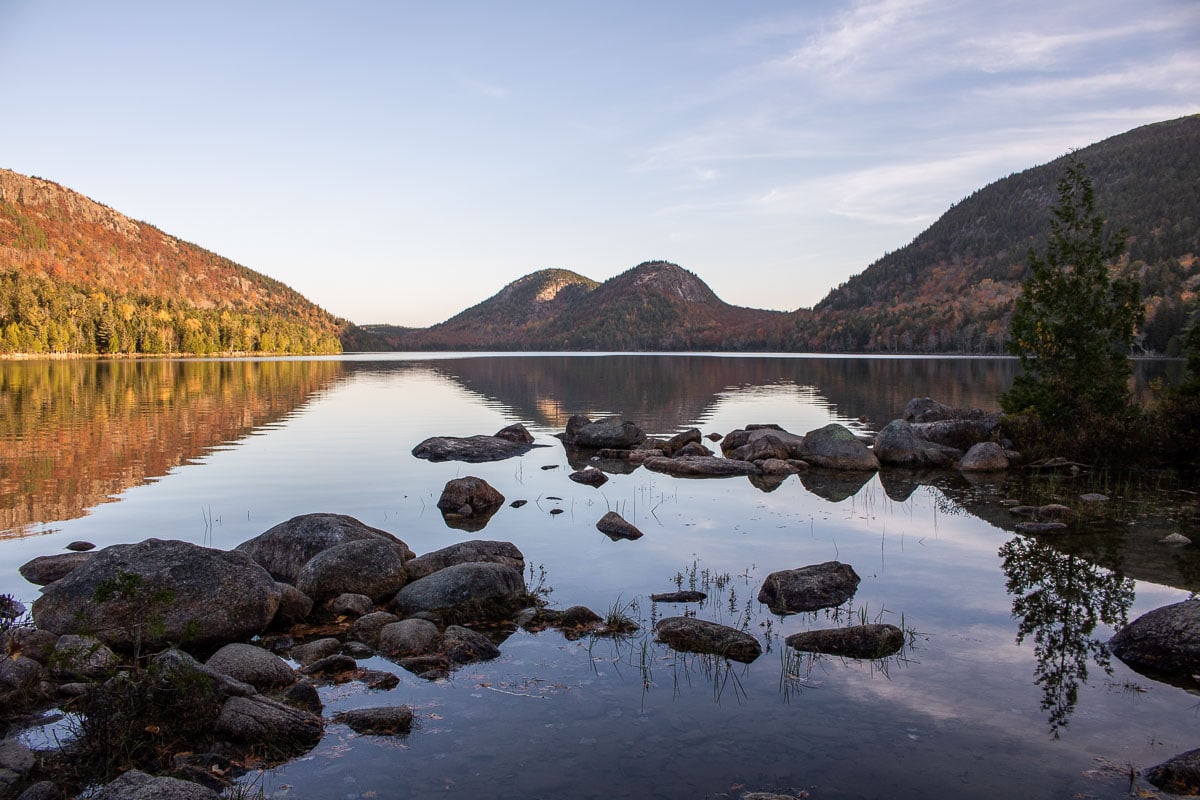
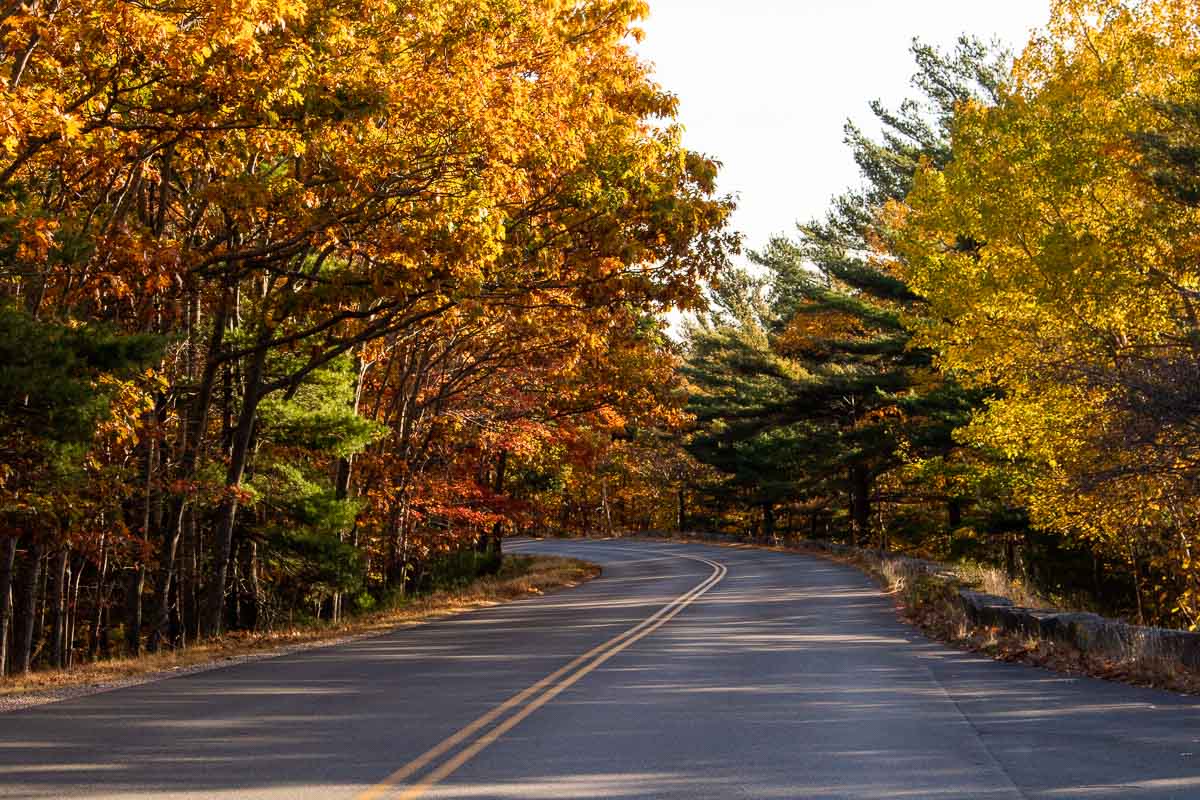
The only national park in New England, America’s premier fall destination, Acadia National Park is the perfect park with which to begin this overview. Come October, tourist numbers peak in New England.
Acadia National Park’s rugged coastlines and forested mountains burst with color in the fall. The scenery is especially stunning on a sunny day, when the reds and oranges contrast spectacularly with the blue sky and ocean.
Some of my favorite places to enjoy the fall colors in Acadia National Park are the Bubbles Nubble Loop, the Jesup Path, and the Jordan Pond area. Most trails and areas in Acadia National Park allow pets, too, making this one of the most dog-friendly national parks in the country.
Consider staying in charming Bar Harbor, a vibrant tourist town just outside the park on Mount Desert Island.
Peak Acadia National Park Fall Colors: mid-October
More About Acadia National Park
- Park Website
- Travel Guide
- Topographic Map
- Best Acadia Hikes
- Top Things To Do in Acadia National Park
- Best Viewpoints
- Accommodation
2. Cuyahoga Valley National Park, Ohio
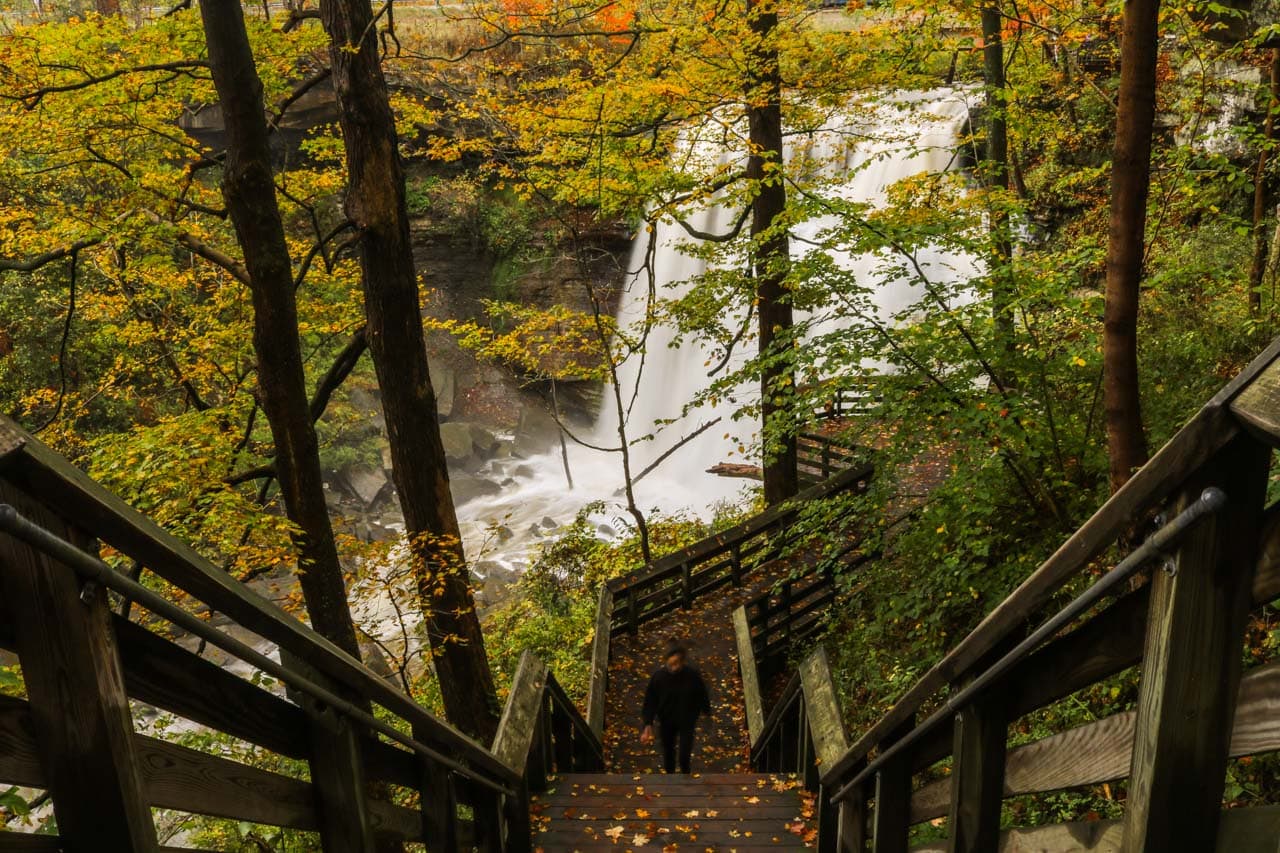
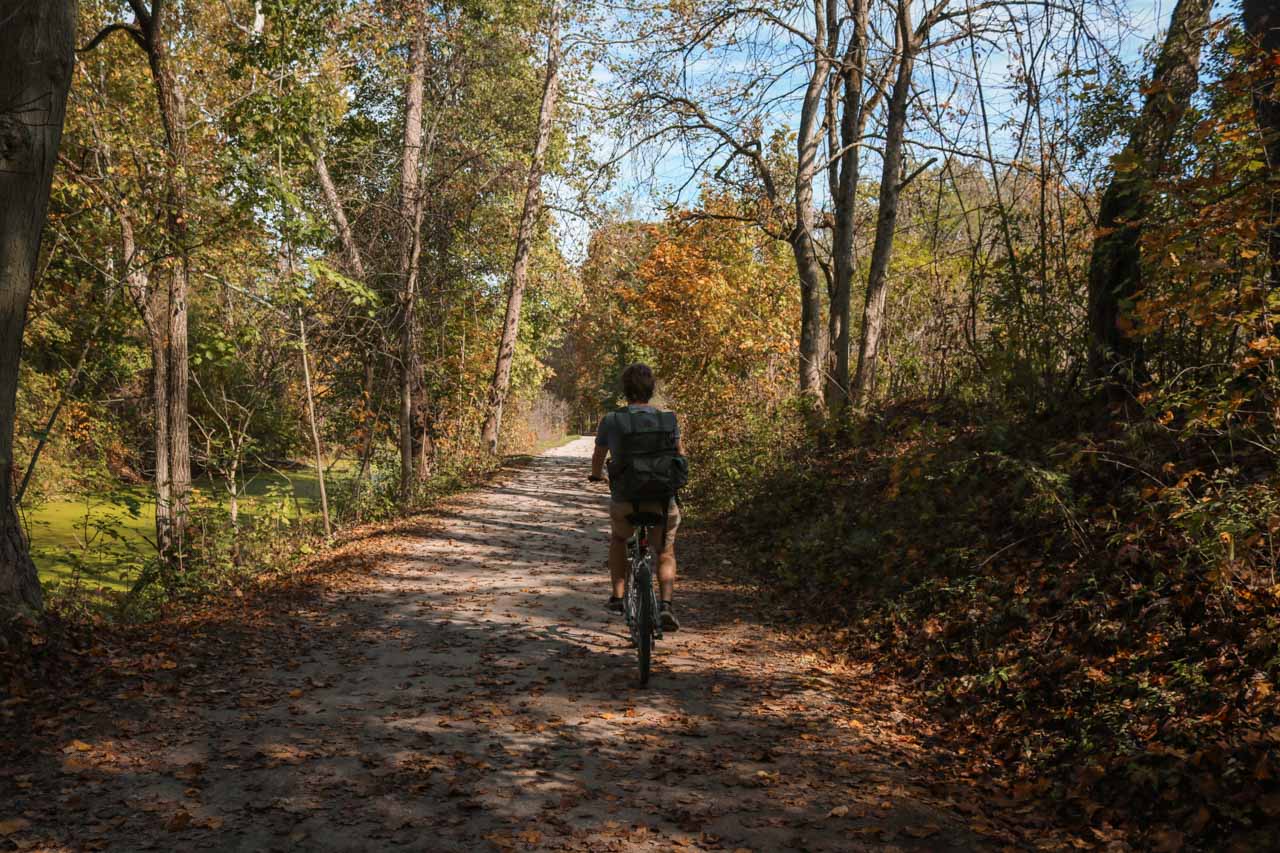
Even though it’s one of the less-known national parks in America, Cuyahoga Valley National Park in northern Ohio is still among the nation’s most-visited parks. Its location in between the cities of Akron and Cleveland has everything to do with that.
Throughout the year, Cuyahoga Valley’s lush forest scenery attracts city-dwellers looking for a nature fix, whether it’s hiking, biking or canoeing.
Because of its dense woodlands, the fall foliage in Cuyahoga Valley National Park is absolutely beautiful. It’s one of the most underrated yet best national parks for fall colors, for sure.
You can enjoy the vibrant autumn colors on the wonderful Ohio & Erie Towpath Trail or from the historic Cuyahoga Valley Scenic Railroad. Brandywine Falls is one of Cuyahoga Valley’s top attractions, but I also really recommend the short hike to Blue Hen Falls.
Peak Cuyahoga Valley National Park Fall Colors: late-October
More About Cuyahoga Valley National Park
3. Glacier National Park, Montana
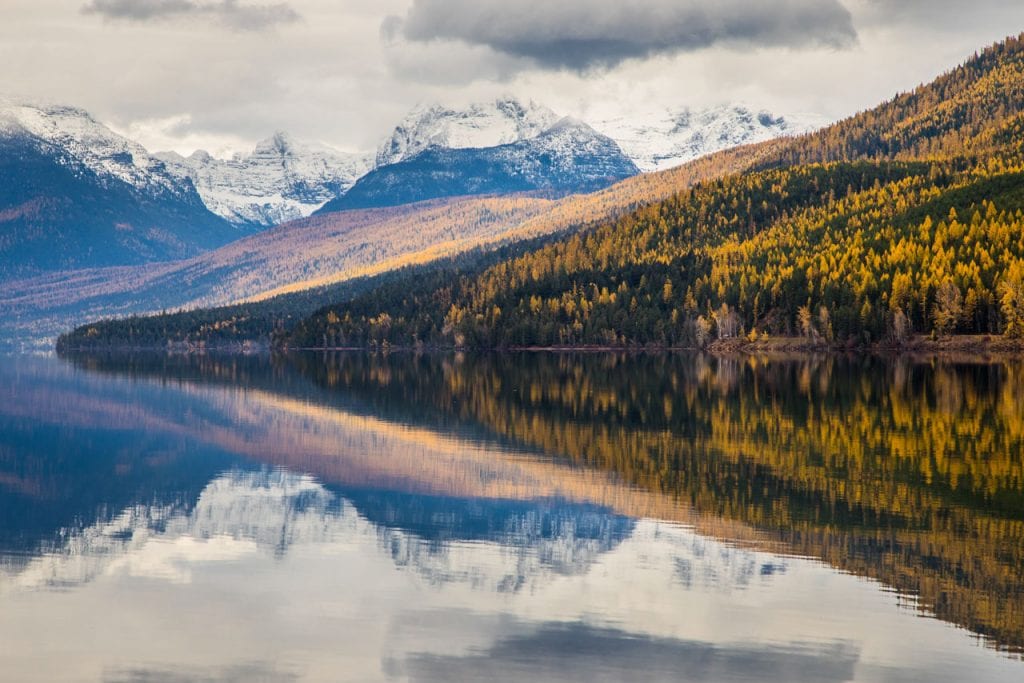
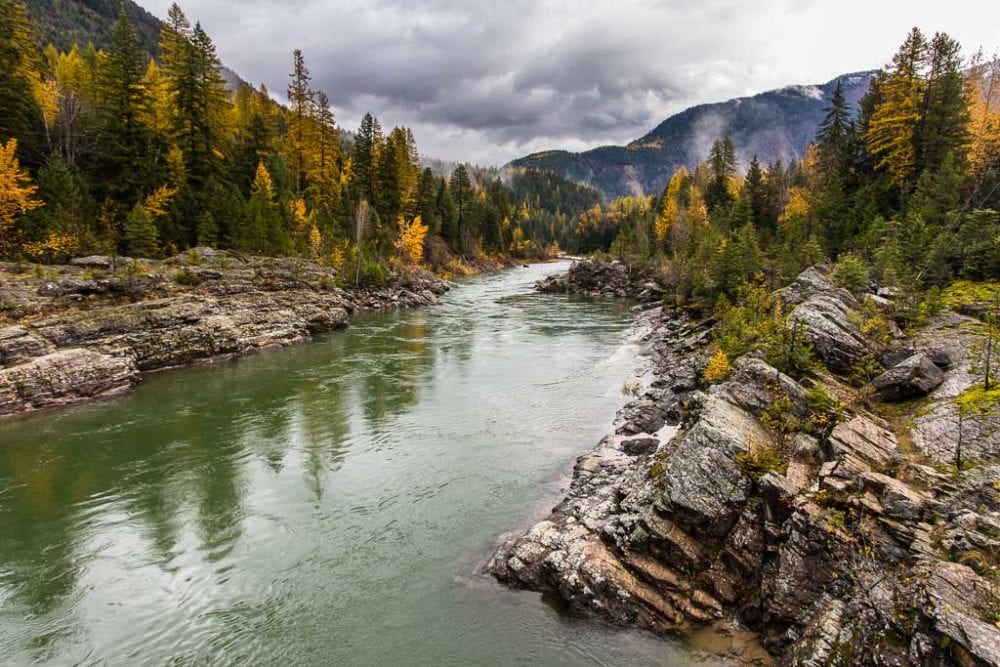
After the peak of summer has passed and the thousands of tourists are gone, Glacier National Park gets a lot quieter pretty quickly. While summer offers epic Glacier hiking and some of the best wildlife viewing in America, fall in Glacier National Park is when the park begins shutting down.
The trees turn colors, while animals are much more active as they prepare for the long winter ahead. Many facilities and accommodations close. It’s a quiet time of year, which has obvious benefits.
Driving the Going-to-the-Sun Road in September is much more relaxed than in summer. It’s nothing short of sensational in the fall.
Glacier is particularly noteworthy because of its western larch trees, a deciduous pine. The best place to see those remarkable trees is on Highway 2 in the park’s southwestern part.
Lake McDonald is another great area to see those golden needles. (Peak color of the larch trees is typically in early-October.)
Late-September and early-October is the best time to see the fall colors in Glacier National Park. Many services and facilities are available or open to the end of September.
By October, you’ll need to be self-sufficient while visiting the park. If you’re visiting Glacier National Park in October, you can find places to stay in nearby gateway towns like Kalispell, Whitefish and Columbia Falls.
Peak Glacier National Park Fall Colors: mid-September to mid-October depending on the area and elevation
More About Glacier National Park
- Park Website
- Travel Guide
- Topographic Map
- Best Glacier Hikes
- Top Attractions on Going-to-the-Sun Road
- Where to See Wildlife in Glacier National Park
- Accommodation
4. Grand Teton National Park, Wyoming
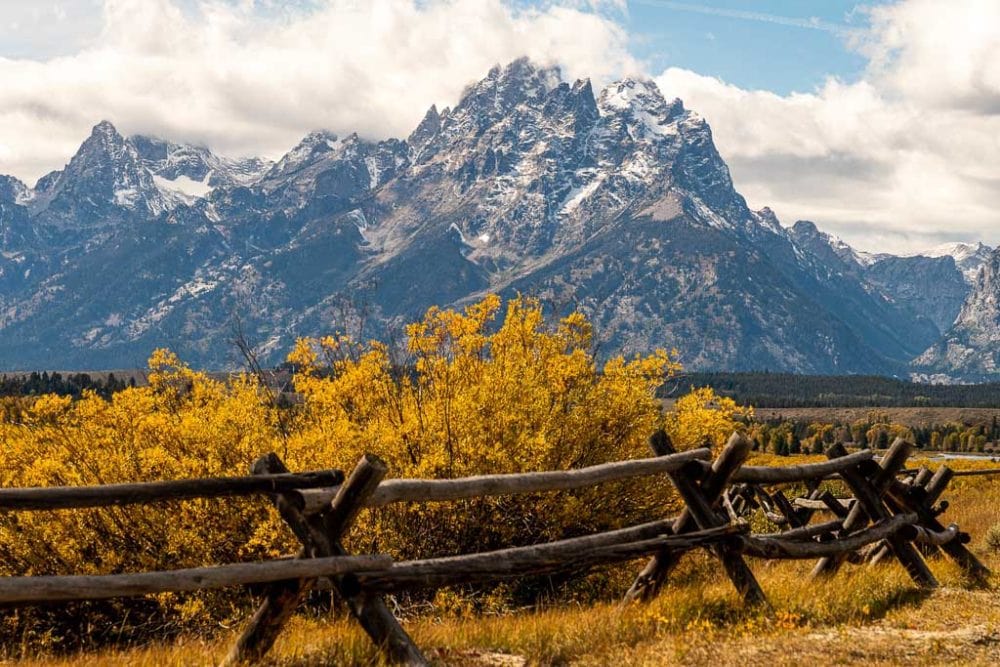
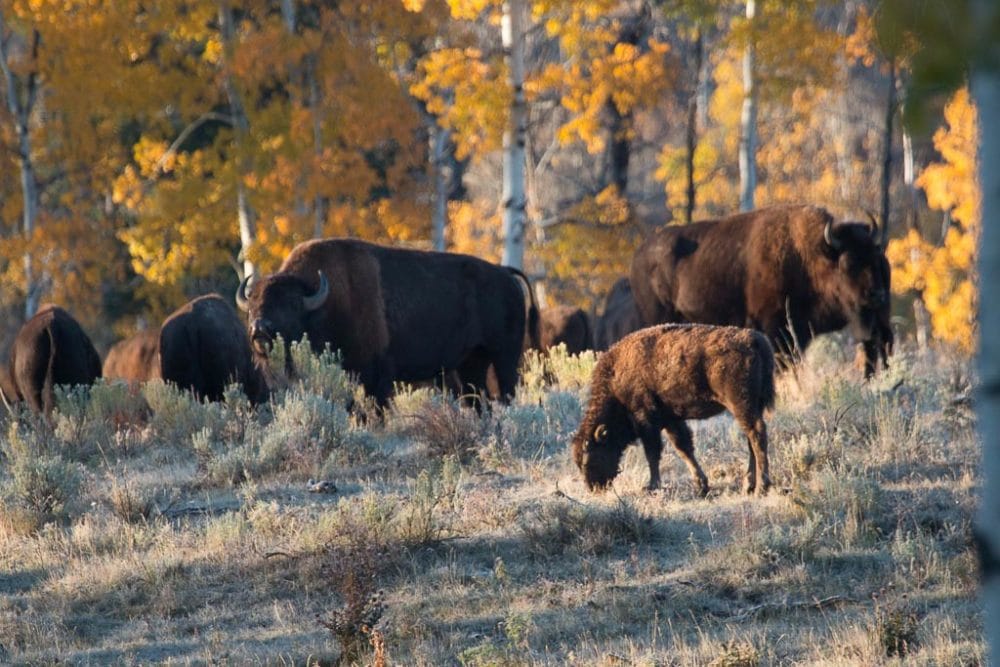
While mainly associated with its jagged mountain peaks, shimmering lakes and exceptional wildlife, such as bison, elk, moose and grizzly bears, Grand Teton National Park is also one of the ten best national parks to visit in the fall.
Autumn in the Tetons is magnificent. The Teton Range boasts large areas of deciduous forests, which blaze with hues of yellow from September through early-October.
You shouldn’t except the typical bright oranges, fire-reds and vibrant purples here, though. Like elsewhere in the Rocky Mountains, fall in Grand Teton National Park is all about the yellows and golds.
Aspen cover the slopes, while cottonwoods line the banks of the Snake River and other streams.
Those yellow leaves glowing in the autumn sun, backed by the majestic Tetons and reflected in lakes, make Grand Teton National Park one of the best national parks for fall photography.
If you have two weeks’ time, I strongly recommend driving from Grand Teton, through Yellowstone, to Glacier National Park. This national parks road trip in the northern Rockies is one of the world’s greatest drives, especially in early-fall.
Peak Grand Teton National Park Fall Colors: late-September
More About Grand Teton National Park
- Park Website
- Travel Guide
- Topographic Map
- Best Grand Teton Hikes
- Top Things To Do in Grand Teton National Park
- Where to See Wildlife in Grand Teton National Park
- Best Views of the Tetons
- Names of Major Teton Range Peaks (With Photos)
- Accommodation
NOTE: Both Glacier National Park and Grand Teton National Park are home to large animals like wolves, grizzly bears, black bears, moose and elk. Be aware you’re entering bear country. You should know what to do when encountering a grizzly bear or a black bear while hiking.
Additionally, fall is when the annual elk rut takes place, while bull moose also actively look for females. All those animals can be much more assertive, even aggressive, in the fall season. Keep your distance!
5. Rocky Mountain National Park, Colorado
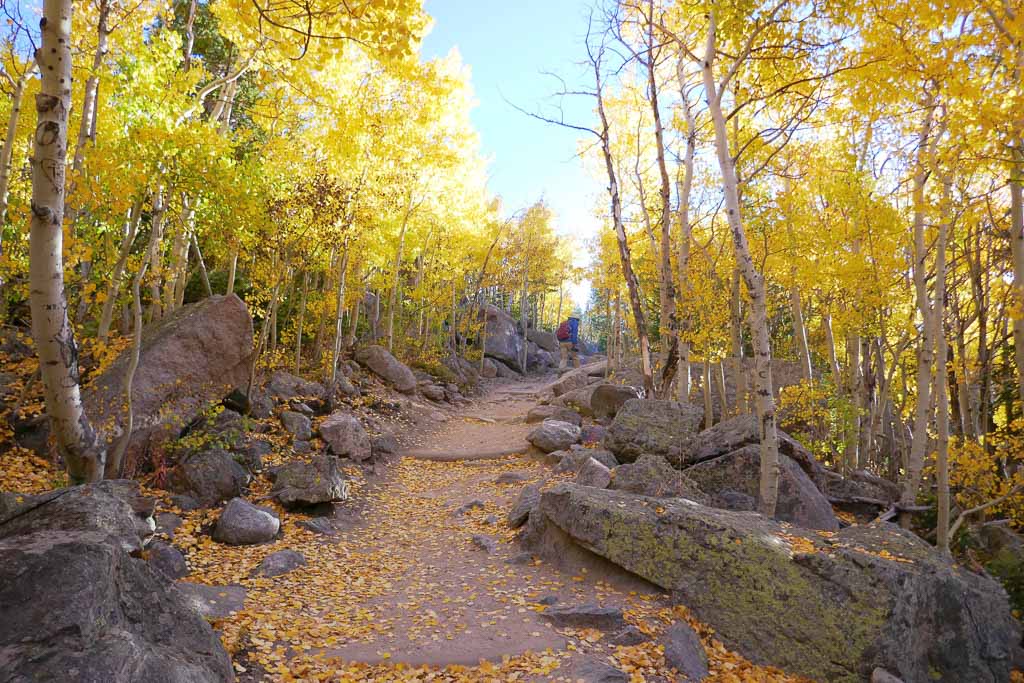
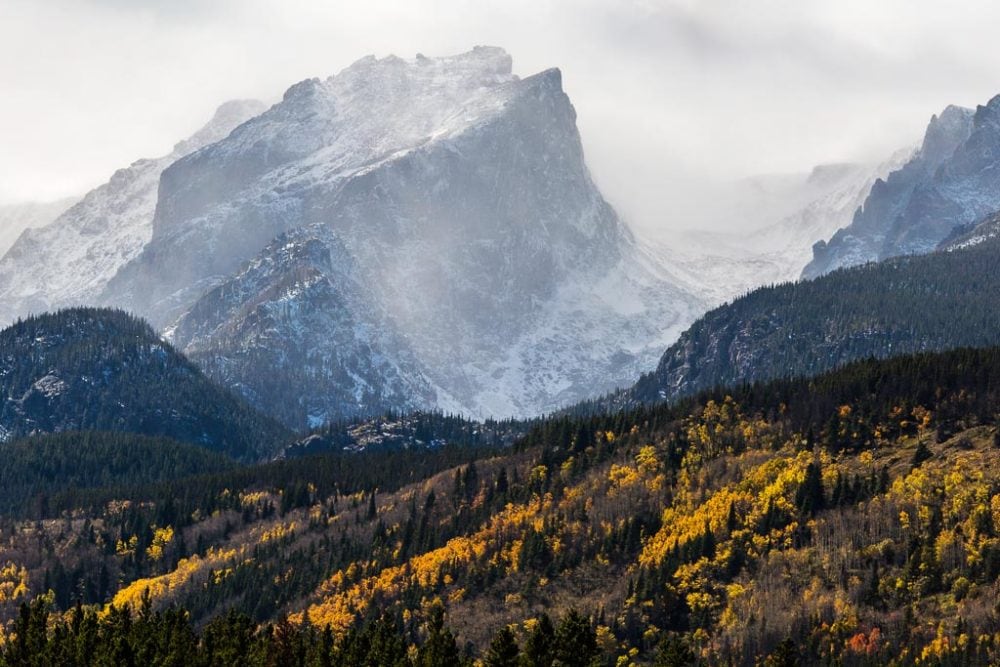
Just like Grand Teton National Park, Rocky Mountain National Park in fall can be described by just one word: yellow.
Since they favor higher elevation, Rocky Mountain’s aspen trees often start turning as early as late-August. The golden colors working their way slowly down the slopes, the aspen fall color peak usually occurs in late-September.
Motorists will relish the opportunity to enjoy this seasonal spectacle from Trail Ridge Road. Reaching an elevation of 12,183 feet, this is one of the highest continuously paved roads in North America.
Famous for its epic views, great wildlife watching, amazing fall foliage and numerous trailheads, this is one of the greatest national park roads anywhere in the country. Additionally, Rocky Mountain is also the nearest national park to Denver, making it super-accessible.
Suggested areas to enjoy the Rocky Mountain National Park fall colors are Bear Lake, Estes Park and the Glacier Gorge Trail.
Peak Rocky Mountain National Park Fall Colors: mid- to late-September
More About Rocky Mountain National Park
6. Great Smoky Mountains National Park, North Carolina & Tennessee
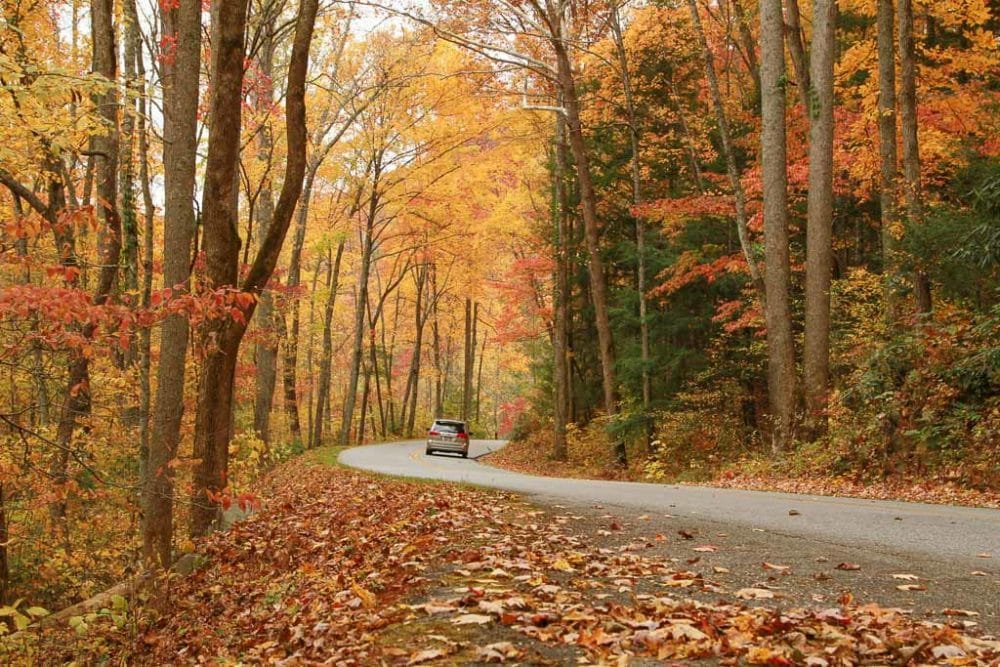
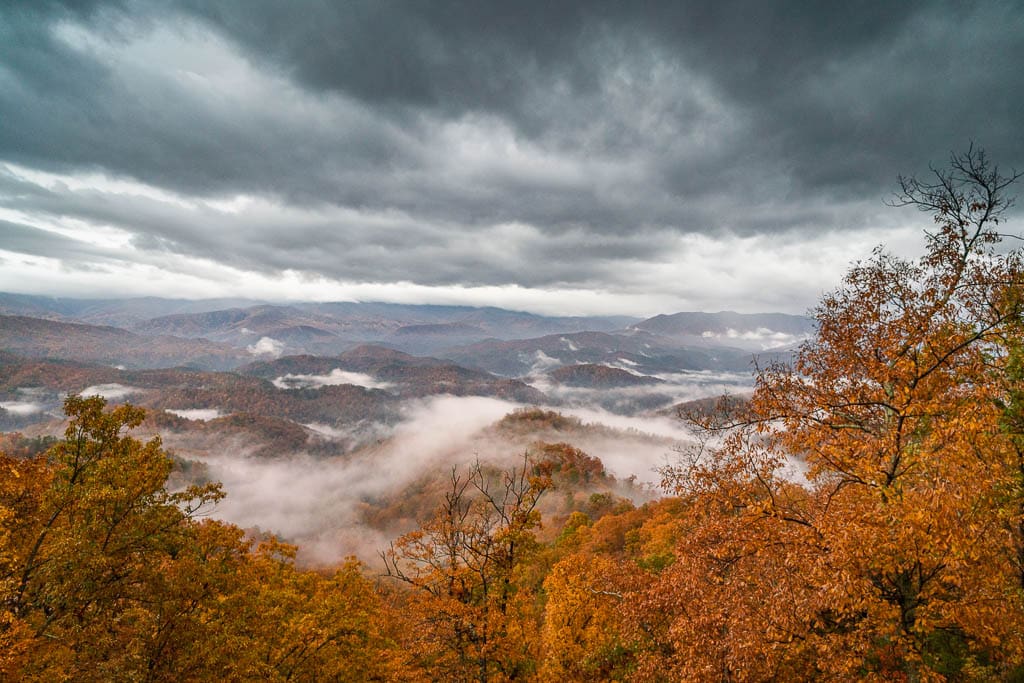
Home to more tree species than all Western European countries combined, Great Smoky Mountains National Park in fall is a natural wonder you need to see to believe. It’s its incredible biodiversity that made UNESCO designate it as World Heritage.
That diversity in flora, including trees, combined with different elevations, is also why the fall season in the Great Smoky Mountains lasts several weeks.
At the park’s highest elevations, trees begin turning in mid-September, while the areas around 4,000 feet are ablaze in color by mid-October. The fall foliage peak in the valleys starts in mid-October and can last until early-November.
Mid-October is often considered to be the best time for fall colors in Great Smoky Mountains National Park. That’s when the highest variety of trees have turned, featuring all kinds of colors, from yellow and orange to red and purple.
Peak Great Smoky Mountains National Park Fall Colors: throughout October
More About Great Smoky Mountains National Park
7. Shenandoah National Park, Virginia
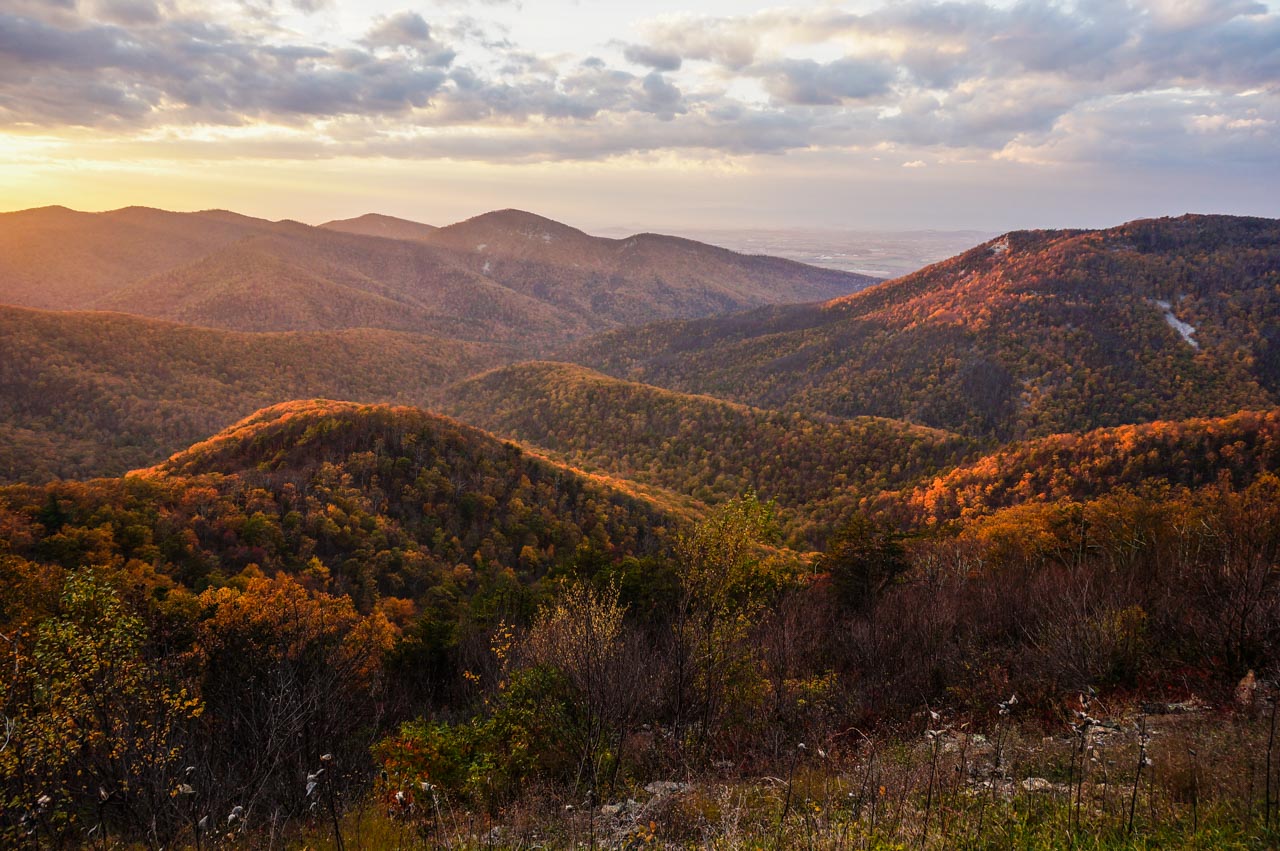
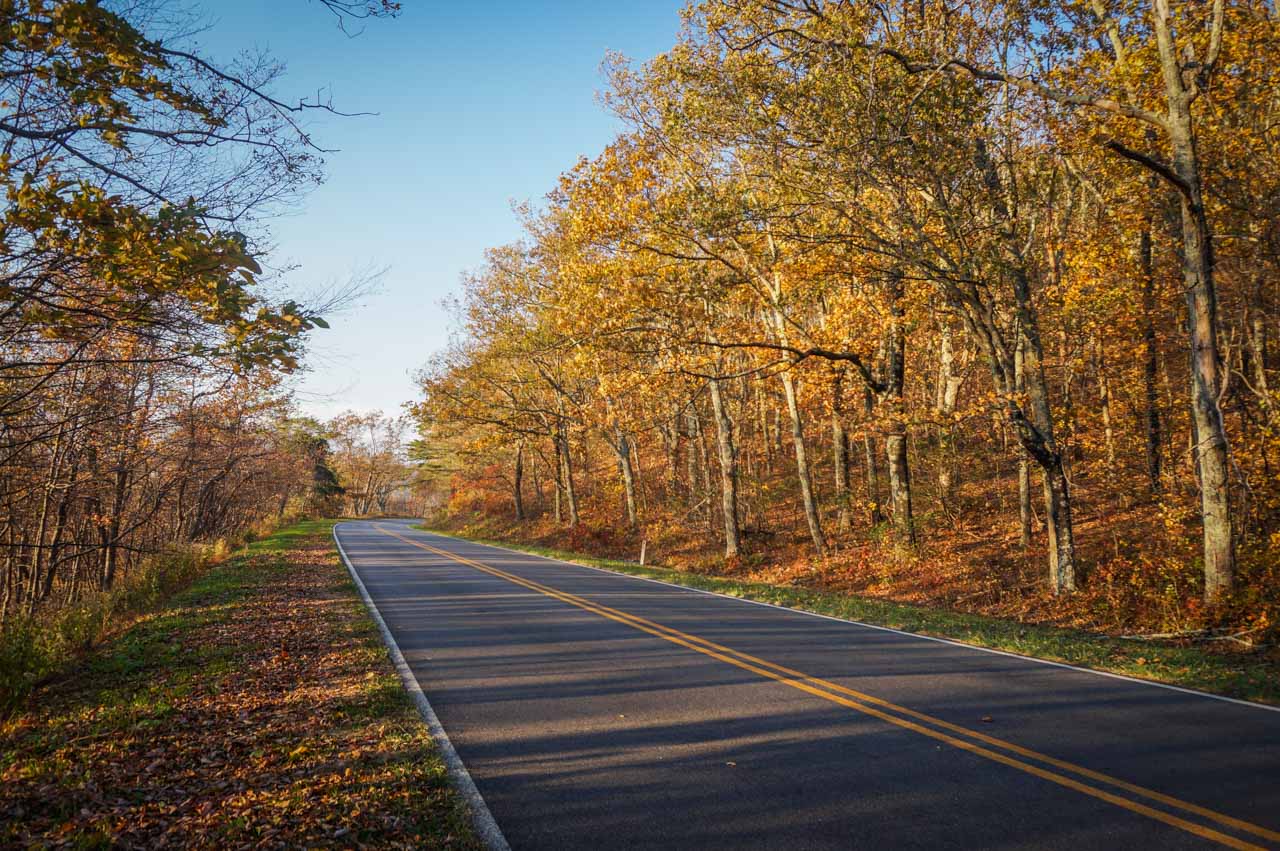
I’ve spent two autumns in Shenandoah National Park before and it’s without question one of my favorite national parks for fall foliage.
Just like Great Smoky Mountains, this is a national park in the Blue Ridge Mountains, a sub-range of the greater Appalachian Mountains. Much of its landscape, topography and natural scenery is similar.
With its endlessly rolling ridges, wooded hollows and valleys, and numerous waterfalls, Shenandoah National Park seems made for fall photography.
More than 70 overlooks line beautiful Skyline Drive, the only public road through the park, while 500 miles of hiking trails lead through forests, to panoramic Shenandoah National Park views or deep into the wilderness.
Because of the numerous overlooks and viewpoints along Skyline Drive, enjoying the fall colors in Shenandoah National Park is exceptionally convenient. There are some great fall hikes in Shenandoah, too.
Additionally, it’s also one of America’s most accessible parks, one of the greatest National Park Service sites in Virginia. The park is only about an hour by car from Washington, D.C. and surrounded by charming towns like Charlottesville and Harrisonburg.
If you’d like to stay inside the park, there are various Shenandoah accommodation options, from campgrounds and cabins to two historic national park lodges: Big Meadows Lodge and Skyland Resort.
Peak Shenandoah National Park Fall Colors: late-October
More About Shenandoah National Park
- Park Website
- Travel Guide
- Topographic Map
- Best Shenandoah Hikes
- Top Things To Do in Shenandoah National Park
- Where to See Wildlife in Shenandoah National Park
- Best Viewpoints
- Accommodation
TIP: The Blue Ridge Parkway connects Shenandoah National Park and Great Smoky Mountains National Park. Also managed by the National Park Service, this 469-mile-long scenic drive runs through Virginia and North Carolina and is also a fantastic destination for fall foliage.
8. Mount Rainier National Park, Washington
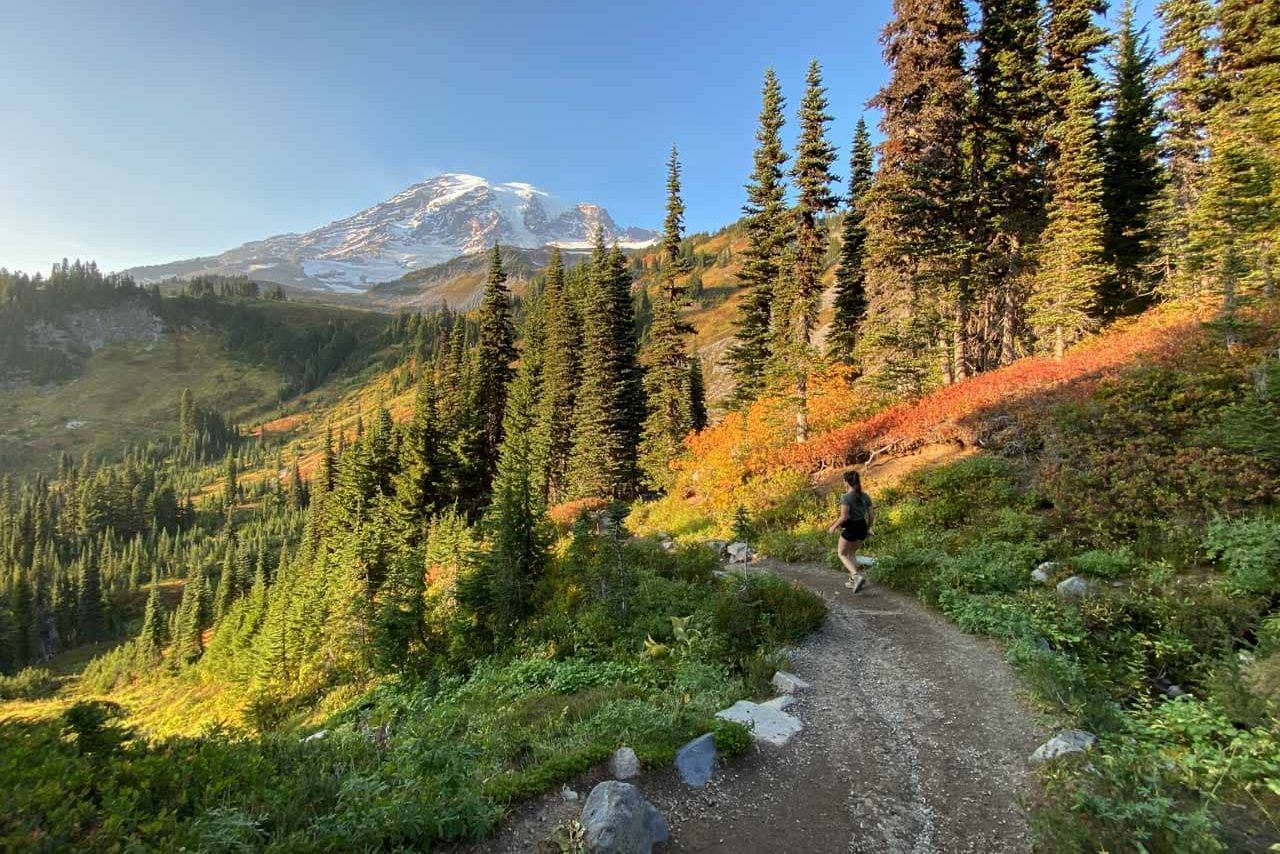
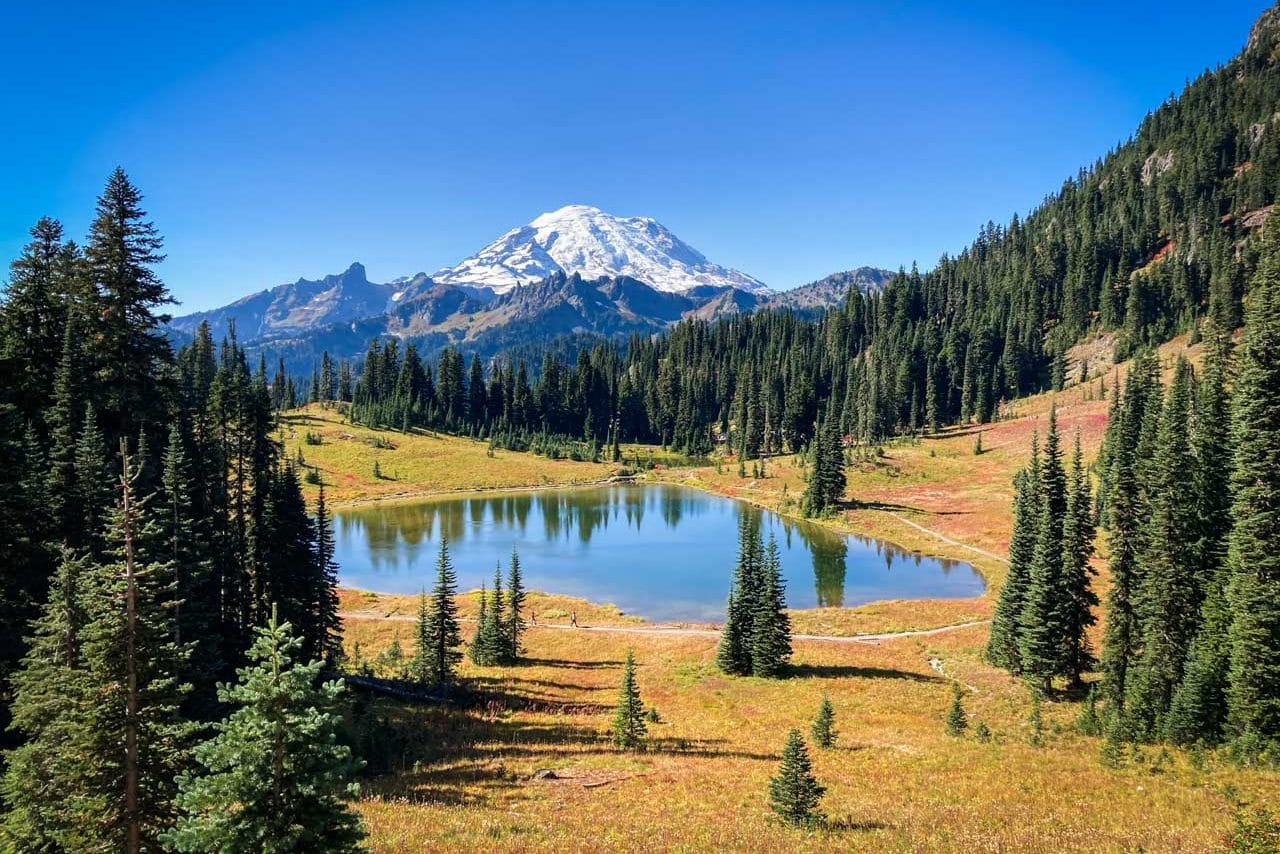
Famous mostly for its spectacular summer wildflowers, which are one of the top Mount Rainier attractions, and phenomenal views, Mount Rainier National Park is also one of the best places to enjoy some West Coast fall foliage.
Although western Washington’s Cascade Range is home to dense pine and conifer forests, there are still also plenty of deciduous plants that show off beautiful fall colors.
This is, however, a high-elevation park and much of the fall foliage at Mount Rainier is provided by shrubs, bushes and small trees, such as huckleberry, elderberry, vine maples and willows.
Stands of cottonwood and aspen light up in vibrant yellows, while deciduous larch trees are found only in the White Pass and Chinook Pass areas, but worth checking out.
One of the easiest and most popular areas to enjoy fall colors in Mount Rainier National Park is Paradise. Hike the beautiful Skyline Trail for all kinds of colors, occasional wildlife sightings and epic views of Mount Rainier and the Cascades.
I also recommend exploring the Tipsoo Lake area, where Chinook Pass offers one of the best views in the national parks system.
Another great thing about this central Washington national park is that it’s a very doable day trip from Portland or Seattle. If you’d like to stay in the park, there are two amazing Mount Rainier National Park inns.
Peak Mount Rainier National Park Fall Colors: early- to mid-October
More About Mount Rainier National Park
- Park Website
- Travel Guide
- Topographic Map
- Best Mount Rainier Hikes
- Top Things To Do in Mount Rainier National Park
- What to Do at Paradise (Mount Rainier)
- Best Views of Mount Rainier
- Accommodation
9. Zion National Park, Utah
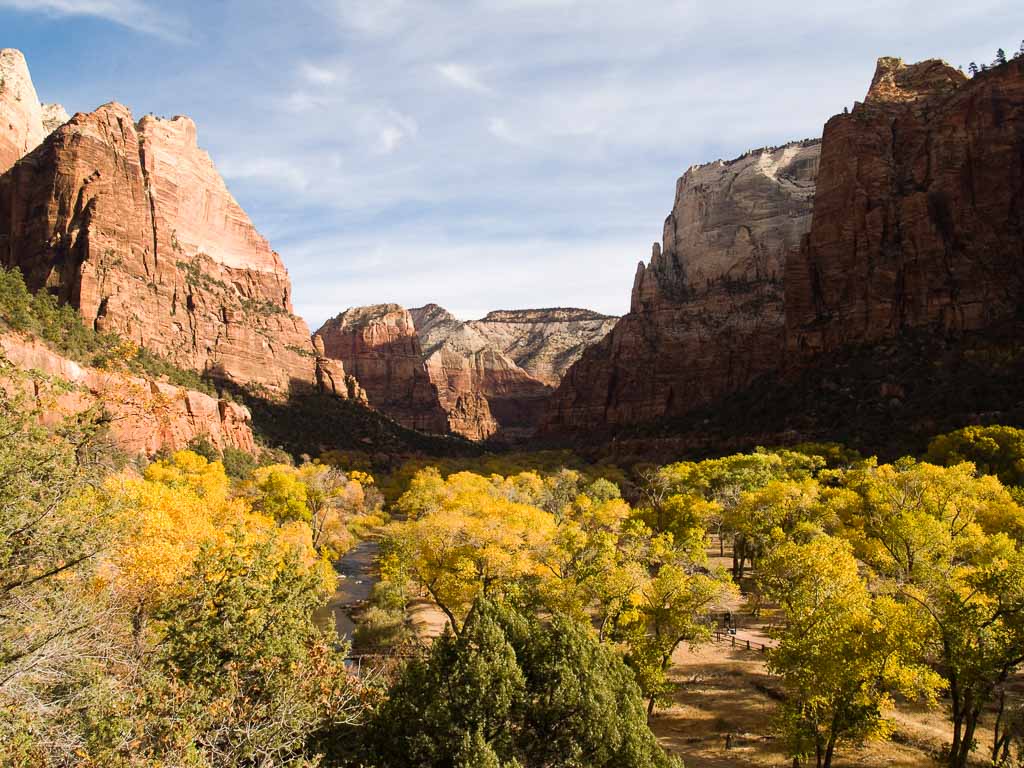
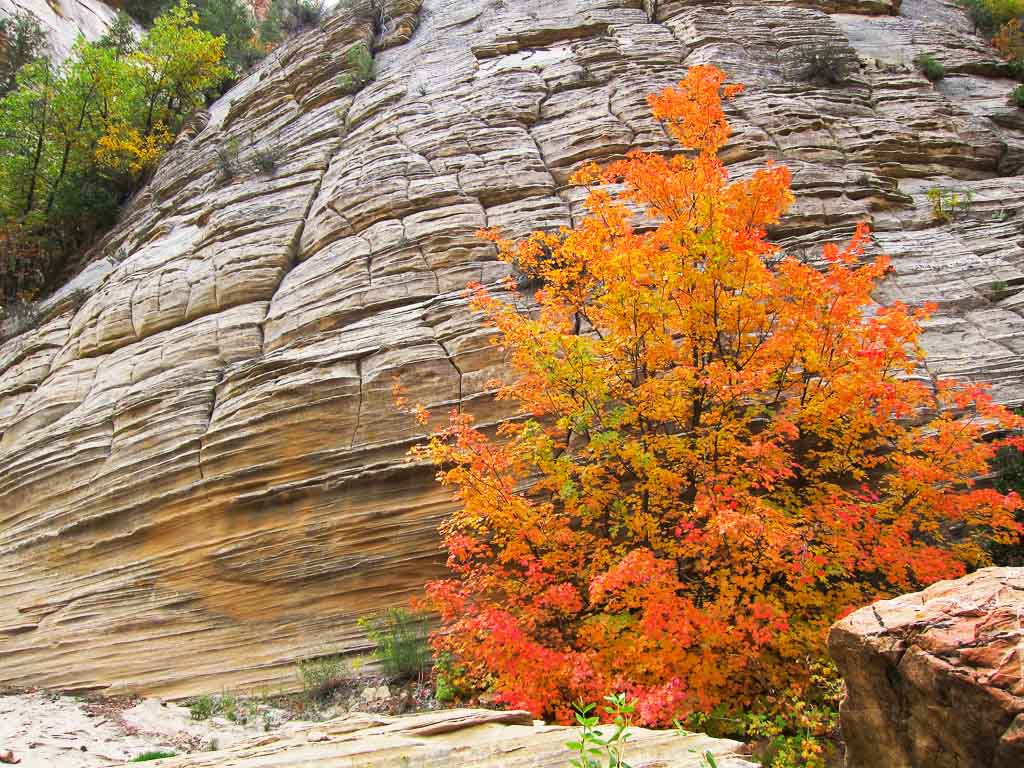
Zion National Park’s world-famous for its spectacular canyon scenery and epic hikes likes the Narrows, Observation Point or Angels Landing. It is, however, also one of the top national parks to visit in fall.
The Virgin River cuts through Zion Canyon, creating a ribbon of riparian habitat in the otherwise desert-like environment in southern Utah.
You’ll find most of the deciduous trees in Zion National Park on the canyon floor or at the lower elevations. Many of those trees are aspen, whose bright yellow leaves complement the red canyon walls beautifully.
The best places to see the fall colors in Zion National Park include the Pa’rus Trail and pretty much everywhere else along the Virgin River.
Peak Zion National Park Fall Colors: late-October to early-November
More About Zion National Park
- Park Website
- Travel Guide
- Topographic Map
- Best Zion National Park Hikes
- Best Views in Zion National Park
- Accommodation
10. New River Gorge National Park, West Virginia
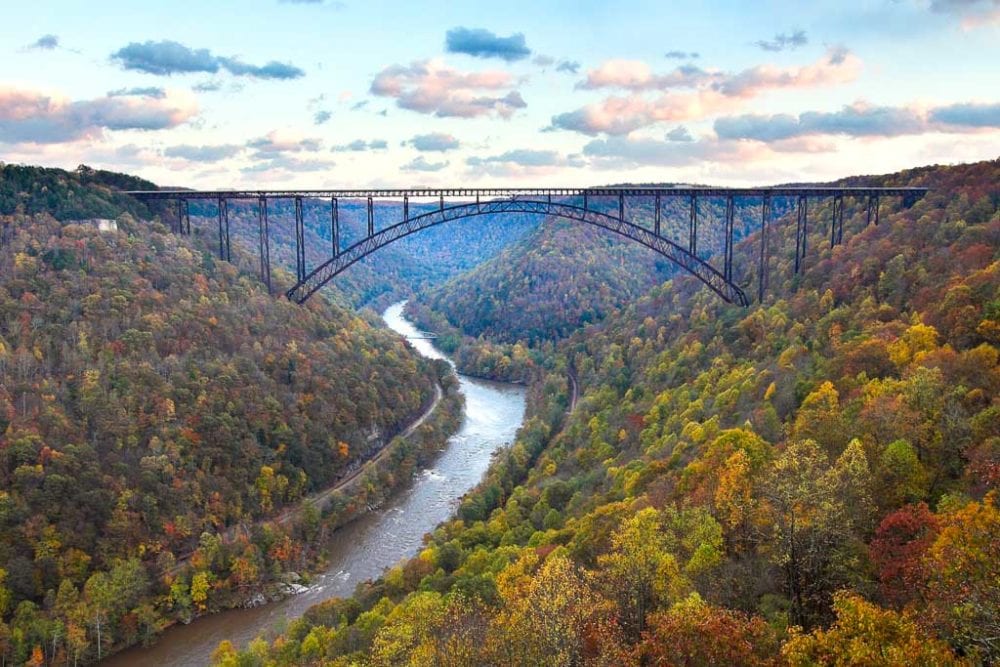
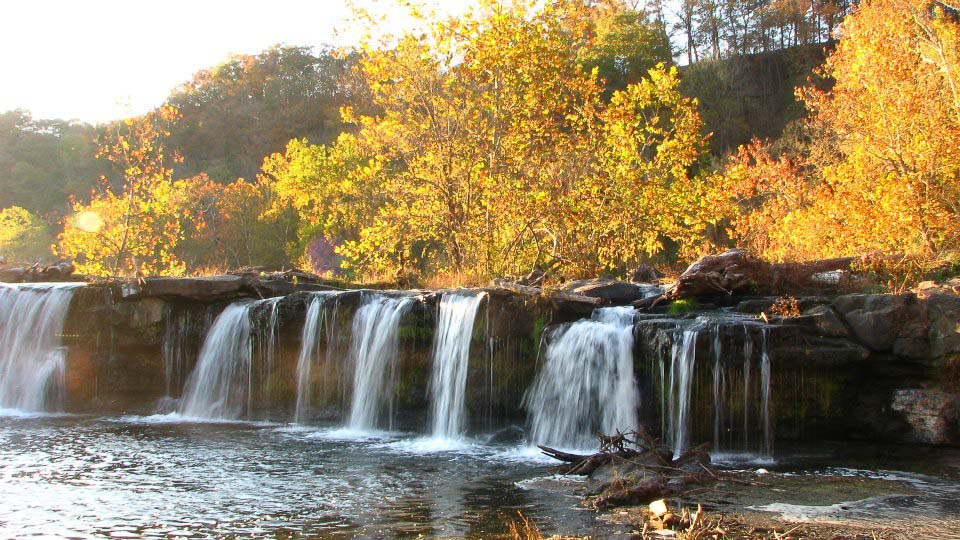
Similar to the other two national parks in the Appalachians above—Great Smoky Mountains and Shenandoah—New River Gorge National Park in West Virginia also showcase an abundance of colors in the fall.
Crossed by the namesake New River, one of the world’s oldest rivers, this scenic national park is home to beautiful overlooks, historic bridges, hiking trails and driving routes. All offer amazing opportunities to enjoy the spectacular fall colors that descend down ancient, forested hills.
Strap on your hiking boots and hit a trail or take a kayak out onto the river for an immersive fall experience. Additionally, autumn marks the harvest season in this historic region, which means apple pies, pumpkins and hay bales galore.
In short, this is one of nicest national parks to visit in for fall foliage in the East.
Peak New River Gorge National Park Fall Foliage: late-October
More About New River Gorge National Park
Best National Parks by Month
Check out the following blog posts for the best national parks to visit in each specific month:
- December: Best National Parks to Visit in December
- January: Best National Parks to Visit in January
- February: Best National Parks to Visit in February
- March: Best National Parks to Visit in March
This is a brand new series I’ve started, so the list will be expanded as I publish new blog posts for each month.
Other National Park Attractions
- Best National Parks for Wildlife Watching
- Best National Parks for Wildflowers
- Top Urban National Parks in America
- National Parks With Native American Heritage Sites
- Most Beautiful National Parks Architecture
- Best National Parks to Visit in Summer
- Best National Parks to Visit in Spring
- Greatest National Parks for Mountain Biking
- Top National Parks for Road Cycling
- Top National Parks for Snowshoeing
- National Parks With Volcanoes in America
- Best National Parks for Stargazing
- Best National Parks to Visit With Dogs
- Warm National Parks For Winter Getaways


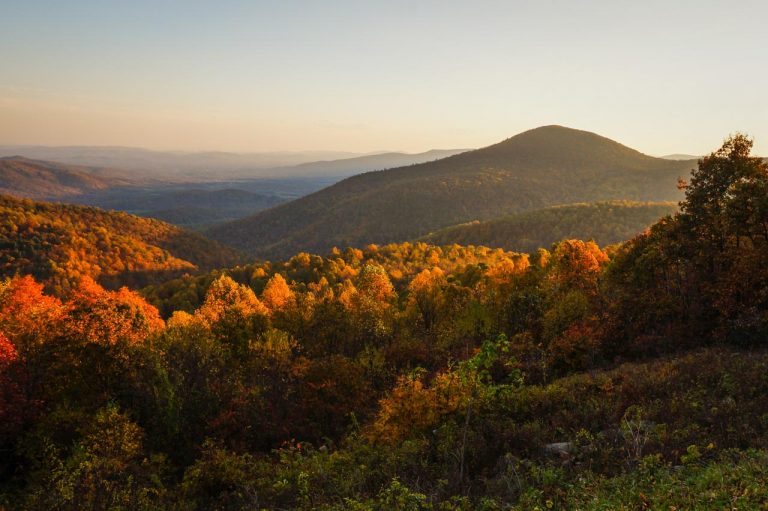


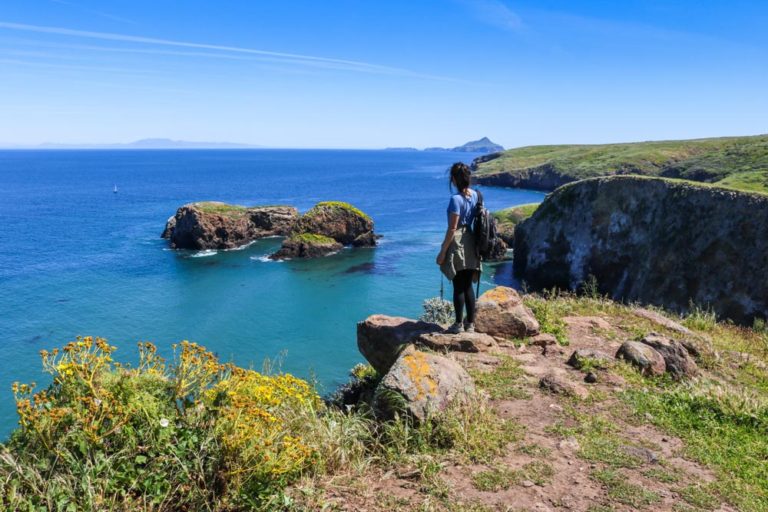


I did landscape photography for a lot of years, so I can appreciate the work and the talent that went into these shots!! I’ve been to some of the National Parks, but I spend my time in retirement recording narration for self-guided tours of the Parks.
Thank you so much for those kind words, Jamie!